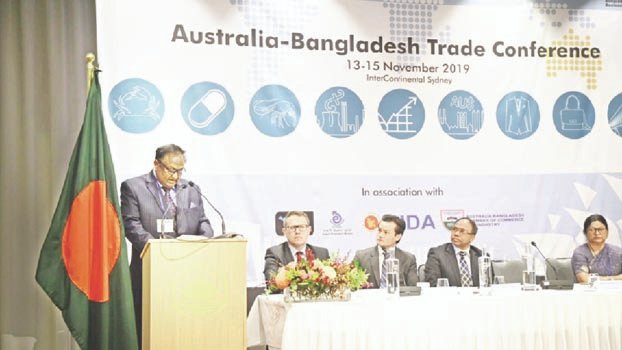Resilient BD economy needs trade diversification, up-skilling HR: Tipu


Commerce Minister Tipu Munshi said the resilient and stable economy of Bangladesh necessitates diversification of trade, greater investment in infrastructure and energy sectors and upskilling of human resources that offers newer opportunities for Australia to intensify bilateral trade.
He said that the country is maintaining a robust economic growth under the leadership of Prime Minister Sheikh Hasina.
Tipu Munshi made the remarks while addressing the inaugural session of the first ever Australia-Bangladesh Trade Conference at Hotel InterContinental Sydney on Thursday.
Bangladesh High Commission in Canberra and Bangladesh Consulate General in Sydney organised the Conference jointly with Australia Bangladesh Business Council (ABBC) to discuss the potentials and challenges of greater economic cooperation between Australia and Bangladesh.
Commerce Minister inaugurated the Conference in the presence of more than 200 participants representing businesses, industry bodies, policy analysts, researchers as well as governments of Bangladesh and Australia.
The representative of the Department of Foreign Affairs and Trade lauded the initiative of Bangladesh High Commission to host such a Conference on behalf of Federal Government. Terming Bangladesh as the “Regional Tiger”, he stated that Bangladesh merits greater attention of Australia.
The inaugural session also had a thematic discussion on “Emerging Bangladesh: prospects of a dynamic Australia- Bangladesh relationship” where Bangladesh High Commissioner Mohammad Sufiur Rahman presented an elaborate road map for bilateral relations to grow.The First day of the Conference comprised three industry and two networking sessions. The industry session on Textiles (Garments, Knitwear) discussed the challenges Bangladesh faces from competitors operating in the basic apparel products and how the challenges would emerge in post LDC era. The face the challenges, session recommended improvement of productivity not only through skills development of labours and mid-level managers but also all the way up to improving efficiency of ports and logistics; diversificationand gradual upgrading to higher end products, creation of own brand, and ensuring greater focus on social considerations. Usages of new technology including automation and adherence to safety and security measures would be imperative as Bangladesh moves to high value market.
The session on agricultural commodity, frozen food and sea food focused on the scope of import of wheat, cotton, milk products, cereals and cattle from Australia to Bangladesh.
Speakers suggested for contract farming with labour from Bangladesh to projects in Northern part of Australia, where climate is closer to that of Bangladesh.
The Industry session on power and energy emphasized on the current status of power production and projection for future production, as per the energy policy of the government, to realize the vision-2041, and import of electricity from the neighbourhood.
Suggestions came for collaboration between Bangladesh and Australia for efficient use of energy, renewable energy projects including energy from hydrogen and fuel cell technology, import of clean coal from Australia etc. Justification for having a power mix of LNG and coals were provided.
In the networking session on Pharmaceuticals, the discussants underlined the procedural challenges of product registration in Australia and focused on investment opportunities in API (Active Pharmaceutical Ingredients) and biotech products in Bangladesh which could be exported to advanced markets including Australia. Bangladesh could forge collaboration for clinical trial/ medical diagnostics of new drugs and research where the scientist of the two countries can work together.

